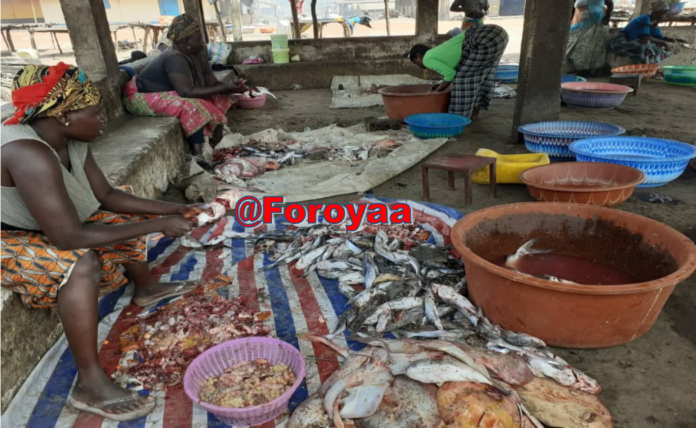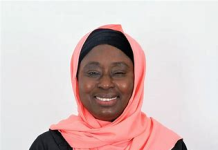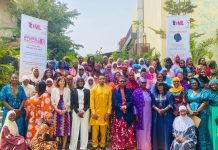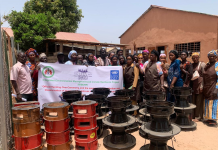With Madiba Singhateh
Women engaged in small scale fishing are faced with several challenges including inadequate access to fund, competition with fish meal factories, and market. They also struggle to get fish.
The major landing sites in The Gambia are Banjul, Tanji, Brufut, Sanyang and Gunjur. Banjul lacks a fish smoking house and a place to dry fish while the majority of the other sites have smokehouses that are dilapidated. The roofs of the smokehouses are not in good condition. Almost all landing sites have improper sanitation facilities.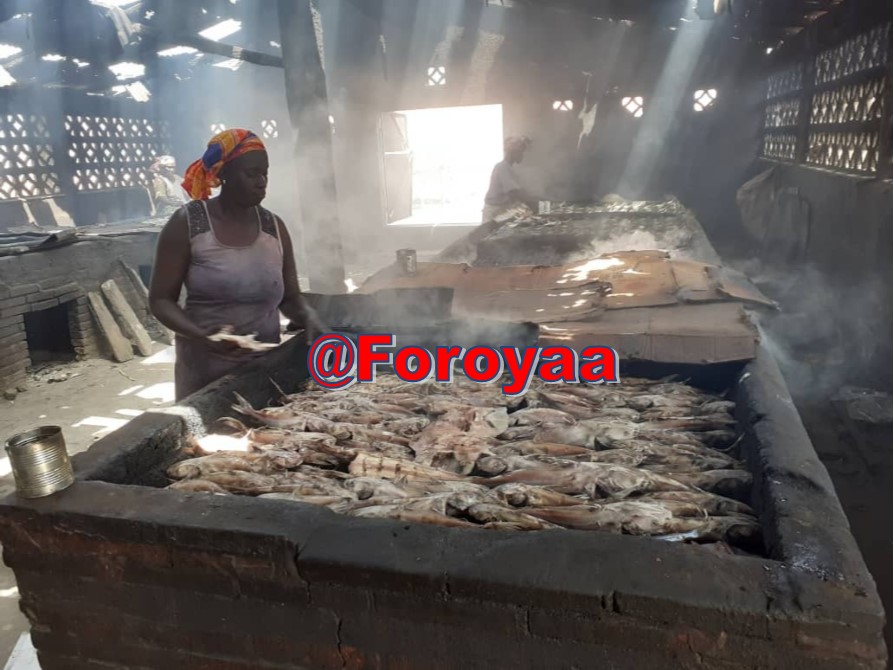
Women in this sector buy fish and resell them. They also smoke, dry and salt fish to preserve them for local consumption.
In The Gambia, the majority of fishmongers are Women. Though men do sell fish, the bulk of fishmongers are women who are found at every landing site of the Gambia’s 80-kilometre long coastline buying, selling, smoking and drying fish.
According to the Food and Agricultural Organisation (FAO), the majority of the twelve million Africans depending on fisheries for their livelihood including three and a half million women are engaged in the artisanal fisheries sector.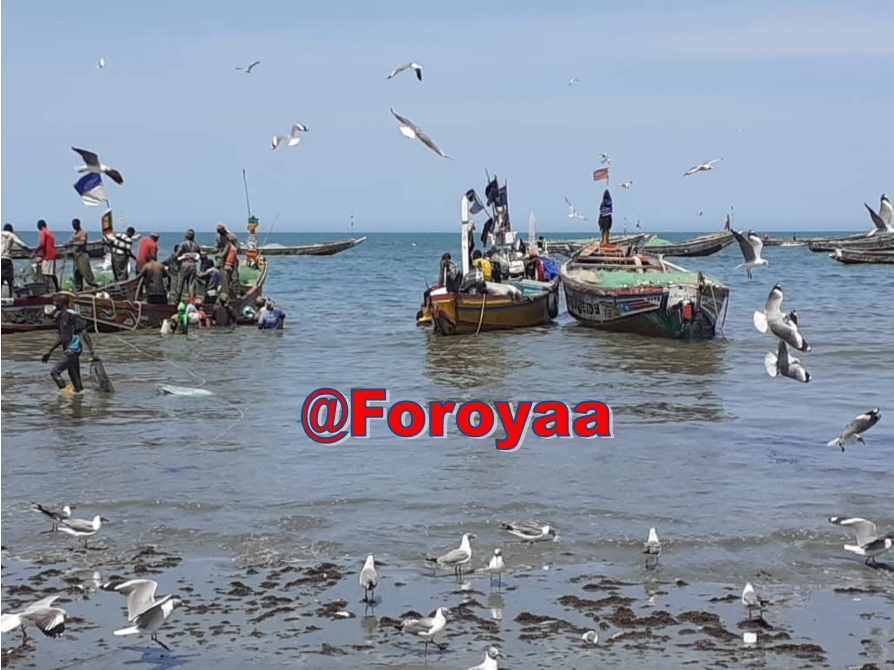
With the advent of fishmeal companies and industrial fishing, small scale women started facing severe competition in buying and reselling fish.
Women who are engaged in the buying and selling of the pelagic species such as Bonga and Sardinella (mackerel), which are widely consumed because they are the cheapest seafood commodity in the country are facing competition from fishmeal factories who process them into finished products like fish feed and fish oil (FMFO).
Women working at the major fishing town of Tanji, Sanyang and Gunjur are working in deplorable conditions with no proper rooftop for smoking houses.
The President of the National Association of Artisanal Fisheries Operators (NAAFO), Fatou Choi said there are so many women in the country who are facing challenges of lack of net. She added that their association provides nets for some of the women but they cannot provide for all of them.
On Government’s intervention, she acknowledged and appreciated it.
“Yes they help us with workshops and bringing consultants in helping us in fish smoking and fish drying. They also help us to receive support from NGOs through FAO, like CAOPA ‘The African Conference on Professional Organizations for Artisanal Fisheries and WADAF (West African Association for Development of Artisanal Fisheries) to train us and build us smoking houses in Brufut, Bakau and Banjul. We have revolving fund from WADAF amounting to four million CFA francs which we give out to women in turns as loans every six months,” she said.
The Women want the government to also provide them with a revolving-fund which they can put into productive use and repay.
She lamented that another problem they are facing is competition with fishmeal plants which are making life difficult for them.
“The other problem we are facing is the fishmeal plants which are making life difficult for some women because there is no other fish for women to sell,” she said.
She said fishermen prefer dealing with the fishmeal factories to the women. She added that people sell their fish to the factory for D250 for a basket and they sell it to the women for D350.
“They only sell to women when they are done with the fishmeal factories,” he said, adding “women should be the priority because they sell their fish in The Gambia while the fishmeal factories export fish abroad,” she said.
Mariam Joof, a fishmonger in Tanji said they have the problem of access to market to sell their fish, adding that they always have troubles with police because they scramble for places to sell their fish.
“We’re truly crying because we are badly in need of a market,” she said, adding that the fish they buy is very expensive which makes marketing them a challenge.
Joof said the situation is very difficult as she called for improvement.
“We certainly need a market because we all cannot converge at the landing site with boats and wheelbarrows,” she said.
She added the Government has allocated a place at the entrance of Tanji, just after the bridge, which is not safe.
“We cannot sell near a bridge because of vehicles, most of the times the drivers over speed and it is not safe for us,” she said.
Mariama Ndong smokes catfish at the Gunjur landing. She said her entire livelihood is dependent on smoking fish.
“I have no help. I pay our children school fees through this and everything I earn is from here,” she said.
She said because the Coronavirus pandemic things are very tough for them.
“We struggle to sell our fish because we are asked to close by 2 pm every day,” she said.
She said the Government is not supporting them and their smokehouses have dilapidated.
“We have received no help from the Government, have you seen our rooftop all is gone? We wonder how we are going to work here in the rainy season. We pay D10 for every shelf to smoke our fish, the money is paid to the Department of Fisheries, but it always takes time before they listen to our complaint,” she asserted.
Ndong lamented that they have no toilet and no pipe-borne water facility at their site.
“We pay to use the toilet and water facilities which are at the other end,” she said.
She concluded that many people do ask them about their difficulties but at the end of the day, they see nothing.
Nyima Gibba, a leader of the women at the smoking houses at the landing site in Gunjur talked about the difficulties they encounter. Madam Gibba lamented that the smokehouses in Gunjur are inadequate adding they take turns to use them. She said they pay to use the smokehouses adding there was one built for them but it is expensive to hire the facility to smoke fish.
“We smoke Catfish and Bonga but we’re facing a serious problem buying the Bonga. They sell the fish to the factories at a price of D300 -D400 but sell it to us for D500. In fact I buy it for D700 at times. Before we get the fish we suffer. The fishermen told us that they have a contract with the fishmeal factories that is why they are given preference over us.
She added: “You know what they do, they will always sell to us at overprice and when there is shortage of fish, they don’t sell fish to us. These factories have really made our work difficult,” she lamented.
Regarding assistance, she said, “Yes we received help because these houses you have seen here have been built by WADAF through FAO.”
Foday Jack, the President of Gambia Association of Artisanal Fishermen said the women in Tanji do not have access to markets to sell their fish.
“We help them in order to have space especially when the boats arrive. This is because the market and shops are too close to the shore, so the women have no space to sell,” she said.
He added: “We had to make it on shift basis, but at times that’s difficult to manage because some of the women don’t want to give chance to the others. The situation here is difficult because everyone wants to get closer and closer.”
He said they also help to link the women to the Bakoteh Fish Market whose Management helps them sell it to the people at affordable prices.
Haddy Gaye, the leader of the women at the Bakoteh Fish Market said they have several problems including the problem of getting fish. She told Foroyaa that there are intermediaries before the fish gets to them.
She said they buy the fish from the fishmeal factories because they can no longer get fish from the landing sites.
“A big basket of fish is sold to us for D1200. When we buy it, we cannot sell it because when it is 2 o clock, we have to close because the Government in the wake of the Coronavirus issued directives for us to sign off at 2pm,” she said.
She said the Government should regulate the price of fish at both the landing sites and at the markets.
The Fish Market Manager, Modou Cham told Foroyaa that the site was purposely established as a market.
‘We have an Ice plant here. We sell ice-block to the women and bakery owners and some women around the market. The ice helps them to have fresh fish all the time,” he said, adding “We also have chill rooms which can be adjusted to freezing point depending on what the customer needs’ he said.
The Permanent Secretary at the Ministry of Fisheries was approached to comment, but he rescinded saying the best person to to talk is Mr. Nfamara S. Darboe, the Director of Fisheries.
Mr. Darboe’s office is one of the refurbished old colonial buildings. He said so many women in The Gambia are engaged in artisanal fisheries including fish processing, smoking and drying and some are even fishmongers.
He said their government is very much interested in improving their role and activities by enhancing some of the facilities they need.
‘We are trying to introduce new technologies of fish smoking in the country which women can adapt and substitute it with their traditional way of fish smoking which is not environmentally friendly,” he said.
He said the technology was introduced by FAO as FTT and was first tried in Thiaroye, the Republic of Senegal.
“This technology is environmentally friendly because it doesn’t have much health hazard on the smoker,” he said.
He added: “We will try to replicate this to all landing sites so that women can process their fish and in fact, another important thing is that the quality of their smoke products are enhanced by this FTT, the health of the smoker is enhanced and the quality of the product is also enhanced.”
He said the technology has been introduced in Gunjur and it is working.
He said one of their main aims is to transform all the traditional fish smoking huts into modern technologies for fish smoking. Darboe promised that the Government will increase the number of smokehouses for all those who need it for them to have access.
On prices of fish, he said the cost of fish is determined by the quality, quantity and its demand, and a lot of operation costs like fuel and others.
On small scale fisheries guidelines, Darboe said they’re working hard to ensure that small scale fishermen and fisheries are better enhanced.
‘We are trying to help the women to enhance their sector,” he said.














